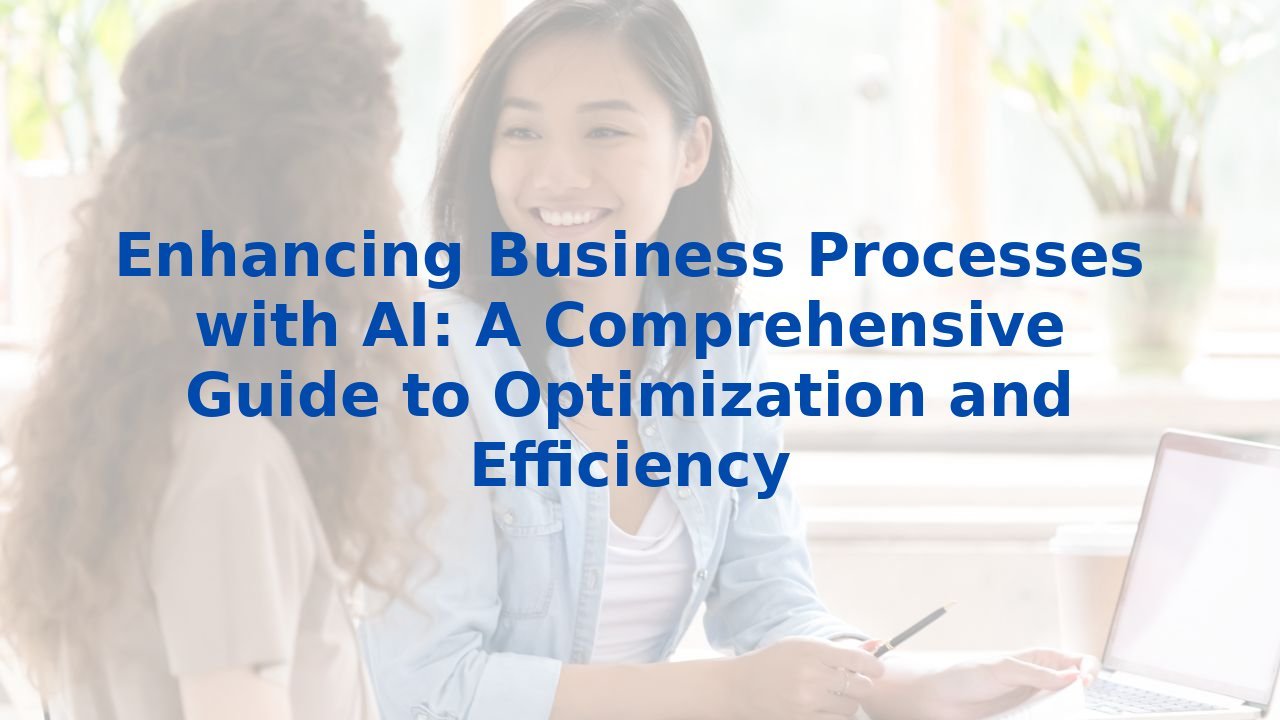Enhancing Business Processes with AI: A Comprehensive Guide to Optimization and Efficiency
Enhancing Business Processes with AI: A Comprehensive Guide
Introduction
In today's fast-paced business environment, organizations are constantly seeking ways to improve efficiency and streamline operations. Artificial intelligence (AI) has emerged as a powerful tool to achieve these goals, transforming various business processes and enhancing overall organizational performance. This guide delves into how AI can optimize business processes, emphasizing automation, decision-making, and continuous improvement.
1. Automating Routine Tasks
One of the primary ways AI enhances business processes is by automating mundane, routine tasks. Leveraging technologies such as Robotic Process Automation (RPA) and intelligent document processing (IDP), organizations can significantly minimize manual labor and reduce the risk of human error. For instance, AI can process high-volume documents—think purchase orders, invoices, and customer requests—effectively freeing up human employees to focus on more strategic activities that add genuine value.
2. Improving Decision Making
AI plays a crucial role in refining decision-making processes. By analyzing vast datasets and identifying intricate patterns, AI provides predictive insights that empower business leaders and analysts to make more informed decisions. For example, it can forecast how different pricing strategies might impact overall profitability, allowing companies to set optimal prices that resonate with customers while safeguarding margins.
3. Enhancing Customer Service
The customer service landscape is being revolutionized by AI technology. Basic inquiries can now be automated, while sophisticated AI systems analyze customer feedback to identify areas needing improvement. Chatbots, for instance, can efficiently handle routine customer requests. Furthermore, AI can dissect incoming requests, extract key information, and seamlessly input this data into a ticketing system for human response. This synergy redefines customer experience and operational efficiency.
4. Process Discovery and Mapping
Continuous improvement lies at the heart of any thriving organization, and AI is the catalyst that drives this endeavor. For instance, process discovery utilizes AI to sift through copious amounts of operational data, revealing inefficiencies hidden from human perception. This phase is vital for optimizing operational models as it uncovers bottlenecks and redundancies.
Then comes AI process mapping, which translates insights gained during discovery into actionable blueprints. By employing machine learning and data analytics, AI visualizes workflows, showcasing how processes interlink while pinpointing where inefficiencies lie. This keeps process documentation up to date and enables organizations to adapt intelligently to evolving business conditions.
5. Process Automation
The most concrete application of AI in business process management is process automation. RPA, heightened by AI, allows for the execution of repetitive, rule-based tasks that would otherwise consume countless hours of human effort. From data entry to managing customer service inquiries, AI-driven automation operates around the clock with unparalleled accuracy. This disruption not only boosts efficiency but liberates human resources to concentrate on more strategic, value-adding endeavors.
6. Continuous Improvement
AI cultivates a culture of continuous improvement by furnishing organizations with ongoing feedback and data-driven insights. By persistently refining processes based on AI-generated feedback loops, businesses can achieve sustained enhancements that drive long-term success. This iterative journey of improvement ensures that business process management strategies evolve in tandem with organizational objectives and industry standards.
Benefits of AI for Business Processes
The integration of AI into business processes yields numerous benefits, including:
- Improved Efficiency: Organizations can minimize errors and significantly increase productivity by automating repetitive tasks and enhancing decision-making processes.
- Enhanced Customer Experience: AI-powered customer service solutions reduce response times and provide tailored support, resulting in higher customer satisfaction.
- Data-Driven Insights: AI offers real-time data analysis, empowering businesses to make informed tactical and strategic decisions.
- Risk Mitigation: AI's capability to identify anomalies in data enables companies to detect potential issues before they escalate.
Training Employees for AI
While AI is an invaluable asset, its true potential is unlocked only when employees are effectively trained to harness its capabilities. Training programs should focus on several key areas:
- Understanding AI Capabilities: Employees need a solid grasp of how AI functions and its limitations to seamlessly integrate it into their daily workflows.
- Data Analysis Skills: Proficiency in data analysis is essential for employees to interpret the insights derived from AI.
- Adaptability: Emphasizing adaptability ensures employees can fluidly transition to AI-enhanced workflows, fostering operational efficiency.
Conclusion
In summary, AI is not just a trend; it is a transformational force reshaping business processes through automation, enhanced decision-making, improved customer service, and a commitment to continuous improvement. By embracing AI, organizations can boost efficiency, mitigate errors, and enhance operational performance. However, to fully reap the benefits of AI, it is essential to invest in training and employee development. This ensures that the workforce is prepared to effectively leverage new technologies and remains agile in the face of rapid change.
To explore comprehensive training solutions for your entire organization and equip your team with essential skills, consider visiting the Complete AI Training Homepage.



